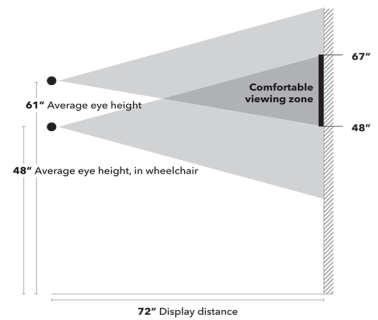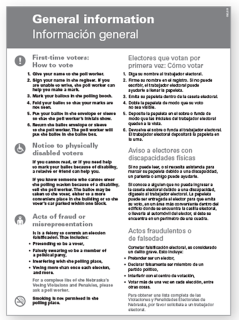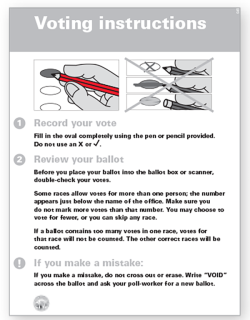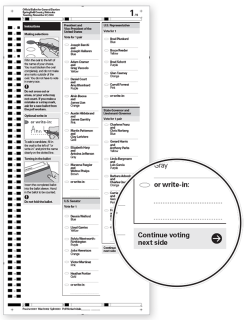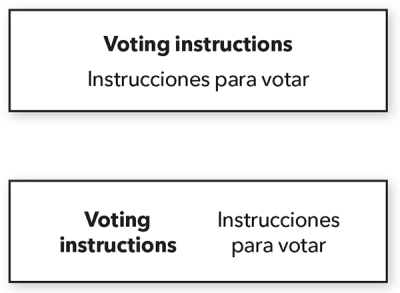Vol. 8 Guiding voters through the polling place
Hurricane Sandy, which struck the East Coast just before Election Day in 2012, delivered lessons and opportunities. Election officials proved just how resourceful they could be as polling places disappeared under water or were without power. The many success stories that came out of that election pointed to a few themes, one of which was about helping voters find their polling places and then make their way to voting within them.
The importance of guiding voters in the polling place
Polling places can be confusing, especially during peak times when there are a lot of voters waiting to vote. Clear, easy to find, easy to read signs can help voters move through the process smoothly, keeping lines moving and minimizing waiting time.
No. 01
Make signs easy to read.
Hang signs at eye level for most voters.
Make sure that signs are visible from around the room. Are they behind poll workers?
No. 02
Show traffic patterns.
Make it easy for voters to navigate the polling place.
Where do they start? Do they have to go to several tables?
Where is the voting system for people with disabilities?
- Identify precincts, districts, or wards clearly.
- Show voters where to line up.
- Make it easy for voters to find the scanner after marking their ballot
No. 03
Use color to identify types of information.
Color and contrast help people quickly identify the purpose and content of signs.
Combine color with text or shape for accessibility.
Use blue for general information.
- CMYK value 90%, 45%, 0%, 0%
- RGB value 0000FF
Use red for voting instructions or ballot information.
- CMYK value 0%, 95%, 100%, 0%
- RGB value FF0000
No. 04
Be clear about actions voters must take.
For voting, make diagrams accurate to your voting system. Close-up line drawings are better than photographs.
Use icons, arrows, or symbols for meaning, not decoration.
Continue voting next side
Instruction is placed at the end of the last column on the page.
No. 05
Provide clear information about behavior in the polling place.
Write in active voice.
Tell voters what to do. Avoid negative (don’t do) when possible.
Before
Voter Assistance Table
After
Register and get provisional ballots here
Before
Cell phones are forbidden
After
Please respect other voters: use your cell phone outside the polling place.
Before
No electioneering within 100 feet of the polling place
After
You may not show, wear, or hand out anything to support a candidate or ballot question within 100 feet of the polling place.
No. 06
Communicate laws and regulations appropriately.
Write a heading or sentence to summarize the law. If possible, paraphrase in plain language.
Include the source of the law so others can look it up.
Work with your counsel to get legal review early.
Before
It is unlawful to remove any ballots from the voting place. Punishable by up to 6 months in jail. #25-2430
After
Do not remove any ballots from the polling place. It is against the law, and you can be punished by up to 6 months in jail.
State Law 25-2430
No. 07
Make it easy to read all languages.
Make it easy to compare the information between languages.
Limit signs to 2 languages.* One should be English.
* English + 2 Asian languages may also work.
Show all languages in parallel: the two languages side-by-side or stacked. Use one image for both languages.
No. 08
Write in plain language.
Write short sentences.
Use simple words.
Think of the voter as “you.”
Write in the positive.
Use numbers on step-by-step instructions.
Keep paragraphs short.
Examples
Review your ballot.
You must fill in the oval for your vote to count.
Please limit voting time to 5 minutes.
Put your phone away.
Cell phones are not allowed in the polling place.
No. 09
Use icons to reinforce instructions.
Use informational icons such as arrows and exclamation points to draw attention to important information or to help voters quickly scan dense information.
The Election Assistance Commission publishes icons like these in camera-ready formats. Request yours (along with Effective Designs for the Administration of Federal Elections, which has lots of other resources).
No. 10
Make the text easy to read.
Use a font large enough to be seen from a distance.
Use upper- and lowercase.
Use sans-serif fonts.
Use white space to separate items on the same sign or poster.
Type should be sized up 1.75 inches for every 50 feet of viewing distance.


